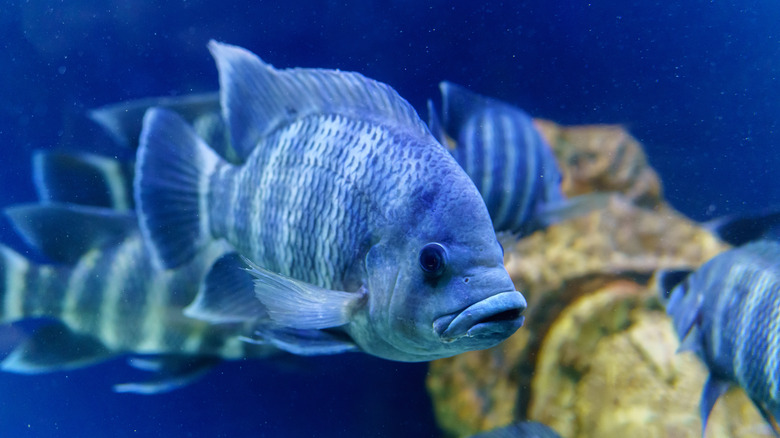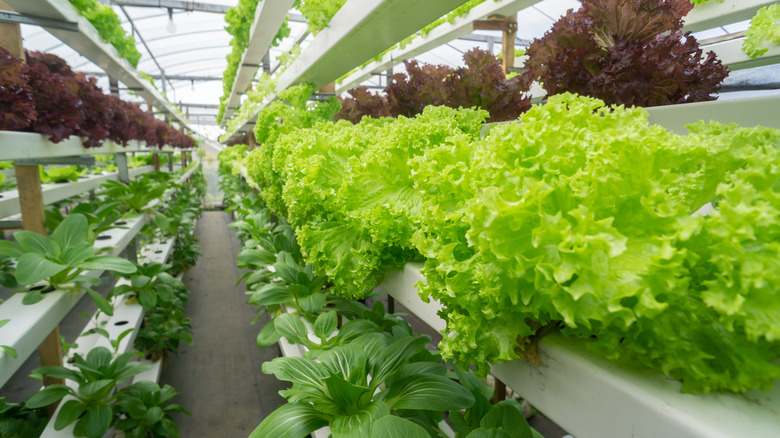What's The Difference Between Hydroponic And Aquaponic Gardening?
At their core, both hydroponic and aquaponic gardening are excellent alternatives to traditional in-the-ground soil-based gardening for many reasons. To begin with, they eliminate the need for large plots of land dedicated solely to crops.
Surprisingly, although both are water-based systems, they each require less water than a standard backyard garden. According to Colorado State University, when water is taken up by a plant, only a tiny fraction of it is actually put to use. The vast majority of it is lost to evaporation and transpiration. If you're irrigating a yard, this water disappears into the ground and the air and needs to be continually replenished. Hydroponic and aquaponic systems reuse the same water over and over again.
Per Trees.com, the benefits of either of these systems over soil-based gardens include a staggering combination of less environmental impact, faster grow times, longer (oftentimes year-round) seasons, and a more bountiful harvest. Imagine an array of fresh fruits, vegetables, and flowers available at your fingertips in less time and with less effort than it's ever taken before.
Although it's quite possible you'll love soilless gardening so much that you'll find yourself building a more complicated apparatus over time, both options are easy to DIY at the start. And even though they may look the same on the outside, there is definitely something distinctive going on below the surface. Let's take a closer look at the differences between hydroponic and aquaponic gardening in order to figure out which is right for you.
Bring on the fish!
The primary difference between hydroponic and aquaponic gardening is the inclusion of aquaculture, which is basically fish farming. In hydroponics, gardeners rely on water they've chemically fertilized to their own specifications to grow plants. In aquaculture, farmers use water for the sole purpose of raising fish. When the two come together they form aquaponics, in which gardeners are simultaneously raising fish in the water that feeds their growing plants. More specifically, they're relying on those fish to organically do the work of any chemical fertilizers or artificial additives.
The Aquaponic Source explains that aquaponic farming is the ultimate representation of the symbiotic relationship between fish, bacteria, and water. Fish naturally produce ammonia through their waste. Good bacteria get to work turning that ammonia into nutrients. Those nutrients are then absorbed by the plants through the water. Another primary distinction with a fish-based system is the fact that you're essentially raising a whole meal, provided you're a fish eater, of course. Because, yes, you can harvest those fish as well.
As opposed to the sterile environment of a hydroponic system, an aquaponic setup is its own natural ecosystem. The fish should be able to take care of themselves for the most part, but it's worth noting that they add an element of life that requires respect and attention.
Other differences
There are cost differences to consider. For instance, chemical fertilizers used in hydroponics tend to be more expensive than the fish that create the same results in aquaponics. Within a hydroponic system, the water will need to be regularly flushed and replaced due to salt and residual chemical build-up. On the other hand, the natural elements of an aquaponic system keep the water balanced so it can stay in place.
When dealing with insects, pesticide requirements will be specific to each. Neither system will demand the same constant attention as a soil-based garden, but when you do have an issue to tackle, you'll have to take the health of the fish into account in an aquaponic system, whereas a hydroponic system would be more straightforward.
Water sensor makers at Sensorex explain that both systems rely heavily on properly balanced pH levels. For aquaponics, you'll keep the water neutral and for hydroponics, you'll lean slightly acidic. This could mean the plants that would be perfect for aquaponics might be a little different than those best grown with hydroponics. Either way, you'll have an abundance of fruit and vegetable varieties to choose from.
In regards to setup and maintenance, a hydroponic system will be simpler at the start. These grow beds can be very shallow since they don't need to allow room for the fish to live and swim around freely. Aquaponic systems take longer to initially set up, yet require less maintenance over time.


